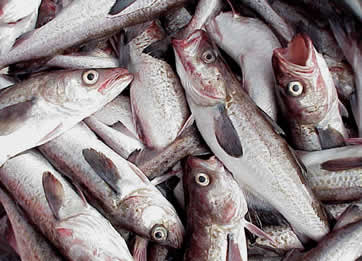Climate and fishing effects on pollock bring international scientists to Anchorage, Alaska
10/26/06
Anchorage, Alaska
Alaska's massive schools of pollock are the mainstay of a billion dollar commercial fishery, the largest single-species fishery in the United States. But will this bonanza survive amid continued fishing pressure and warming ocean waters caused by climate change?

Scientists will discuss the ability of pollock, cod, and other members of a family of fishes called gadids to adapt to human and environmental pressures at an international symposium in Anchorage October 31-November 3, 2006. The symposium will take place at the Hotel Captain Cook.
The conference, Resiliency of Gadid Stocks to Fishing and Climate Change, will draw fisheries experts from the United States, Canada, Norway, Russia, and other fishing nations, to discuss what's needed for gadids to cope with fishing and climate change. Symposium organizers discuss and compare different management systems and marine ecosystems over multiple climate regimes.
The meeting is the 24th Lowell Wakefield Fisheries Symposium, coordinated by Alaska Sea Grant since 1982 to bring scientists together to discuss research and help improve fisheries management and marine conservation. The series is named after Lowell Wakefield, founder of the Alaska king crab industry.
Gadids include 30 species of cods, haddocks, pollocks, lings, whitings, and hakes that inhabit the cold waters of the North Atlantic, North Pacific, and Arctic oceans.
Source: Alaska Sea Grant Press Release
|
More News on AlaskaReport


|

